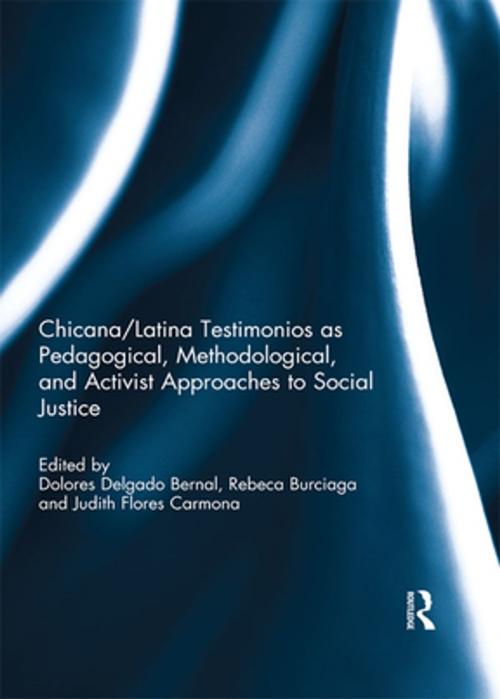Chicana/Latina Testimonios as Pedagogical, Methodological, and Activist Approaches to Social Justice
Nonfiction, Reference & Language, Education & Teaching| Author: | ISBN: | 9781317332893 | |
| Publisher: | Taylor and Francis | Publication: | October 2, 2017 |
| Imprint: | Routledge | Language: | English |
| Author: | |
| ISBN: | 9781317332893 |
| Publisher: | Taylor and Francis |
| Publication: | October 2, 2017 |
| Imprint: | Routledge |
| Language: | English |
While the genre of testimonio has deep roots in oral cultures and in Latin American human rights struggles, the publication and subsequent adoption of This Bridge Called My Back (Moraga & Anzaldúa, 1983) and, more recently, Telling to Live: Latina Feminist Testimonios (Latina Feminist Group, 2001), have demonstrated the power of testimonio as a genre that exposes brutality, disrupts silencing, and builds solidarity among women of colour.
Within the field of education, scholars are increasingly taking up testimonio as a pedagogical, methodological, and activist approach to social justice, which transgresses traditional paradigms in academia. Unlike the more usual approach of researchers producing unbiased knowledge, the testimonio challenges objectivity by situating the individual in communion with a collective experience marked by marginalization, oppression, or resistance. This approach has resulted in new understandings about how marginalized communities build solidarity, and respond to and resist dominant culture, laws, and policies that perpetuate inequity.
This book contributes to our understanding of testimonio as it relates to methodology, pedagogy, research, and reflection in pursuit of social justice. A common thread among the chapters is a sense of political urgency to address inequities within Chicana/o and Latina/o communities. This book was originally published as a special issue of Equity & Excellence in Education.
While the genre of testimonio has deep roots in oral cultures and in Latin American human rights struggles, the publication and subsequent adoption of This Bridge Called My Back (Moraga & Anzaldúa, 1983) and, more recently, Telling to Live: Latina Feminist Testimonios (Latina Feminist Group, 2001), have demonstrated the power of testimonio as a genre that exposes brutality, disrupts silencing, and builds solidarity among women of colour.
Within the field of education, scholars are increasingly taking up testimonio as a pedagogical, methodological, and activist approach to social justice, which transgresses traditional paradigms in academia. Unlike the more usual approach of researchers producing unbiased knowledge, the testimonio challenges objectivity by situating the individual in communion with a collective experience marked by marginalization, oppression, or resistance. This approach has resulted in new understandings about how marginalized communities build solidarity, and respond to and resist dominant culture, laws, and policies that perpetuate inequity.
This book contributes to our understanding of testimonio as it relates to methodology, pedagogy, research, and reflection in pursuit of social justice. A common thread among the chapters is a sense of political urgency to address inequities within Chicana/o and Latina/o communities. This book was originally published as a special issue of Equity & Excellence in Education.















